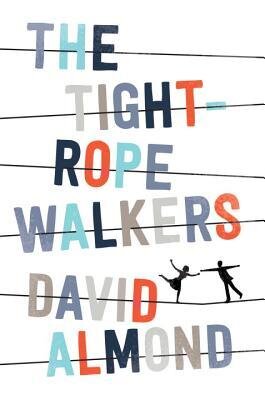The Pain and Glory of Adolescence in The Tightrope Walkers by David Almond
 Dominic Hall is the son of a mother with dreams and a bitter, disappointed war veteran father. Simpson's Shipyard looms over their town, an occupational sinkhole to trap workers and their families. The borderland location in northern England seems to symbolize the teetering life of its adolescent narrator. The book is suffused with love and grief, ambiguity, contradictory longings and fears. The emotions seem to pour directly from the gritty background of the pebbledashed housing estate and the ever-present shipyard. An ecstatic and enduring first love reveals its myriad complications as young Dominic grows beyond childhood. The story progresses to the beat of his vacillating heart. The first person narrative casts secondary characters in tender detail. As a reader, I felt as if I were witness to something exquisitely private, yet so terrifying in its honesty that I couldn't look away.As Dominic and Holly dare to follow the impractical dream of an education, the tight-rope of their shared childhood stretches literally and metaphorically over the pages. Desperate cruelty hovers as well in the person of the brutal and complicated Vincent McAlinden. The tussle of lifestyle and language is underscored by the rich use of dialect, which Dominic weaves his way in and out of, much as his life itself wavers between staying and leaving.Almond blurs the borders between heaven and hell in this beautiful, unflinching novel, which was first published for an adult audience in the UK and released as a YA crossover book by Candlewick in the US in 2015. I haven't read the original, so I'd love to know how much has changed between the two editions. The Candlewick edition tilts somewhat towards hope in the end, and therefore feels pretty securely YA to me. Still, it wasn't an ending I'd seen coming. Closing the book, I wondered, did I want a little more of a different kind of hope? Something to assure me that the dreams of childhood, even deferred, might have stood a chance?But wait. Returning to the writerly retrospective opening, I can hear it.
Dominic Hall is the son of a mother with dreams and a bitter, disappointed war veteran father. Simpson's Shipyard looms over their town, an occupational sinkhole to trap workers and their families. The borderland location in northern England seems to symbolize the teetering life of its adolescent narrator. The book is suffused with love and grief, ambiguity, contradictory longings and fears. The emotions seem to pour directly from the gritty background of the pebbledashed housing estate and the ever-present shipyard. An ecstatic and enduring first love reveals its myriad complications as young Dominic grows beyond childhood. The story progresses to the beat of his vacillating heart. The first person narrative casts secondary characters in tender detail. As a reader, I felt as if I were witness to something exquisitely private, yet so terrifying in its honesty that I couldn't look away.As Dominic and Holly dare to follow the impractical dream of an education, the tight-rope of their shared childhood stretches literally and metaphorically over the pages. Desperate cruelty hovers as well in the person of the brutal and complicated Vincent McAlinden. The tussle of lifestyle and language is underscored by the rich use of dialect, which Dominic weaves his way in and out of, much as his life itself wavers between staying and leaving.Almond blurs the borders between heaven and hell in this beautiful, unflinching novel, which was first published for an adult audience in the UK and released as a YA crossover book by Candlewick in the US in 2015. I haven't read the original, so I'd love to know how much has changed between the two editions. The Candlewick edition tilts somewhat towards hope in the end, and therefore feels pretty securely YA to me. Still, it wasn't an ending I'd seen coming. Closing the book, I wondered, did I want a little more of a different kind of hope? Something to assure me that the dreams of childhood, even deferred, might have stood a chance?But wait. Returning to the writerly retrospective opening, I can hear it.
I was born in a hovel on the banks of the Tyne, as so many of us were back then. It was a three room dilapidated upstairs flat, in the same terraced row where Dad had been born, and just upriver from Simpson's Shipyard. Rats slunk under the floorboards, mice scuttled in the walls. The bath hung on a nail on the wall, the toilet was at the foot of steep steps outside. The river slopped against the banks and stank when the tide was low. There was the groan of engines and cranes from the yard, the din of riveters and caulkers. Sirens blared at the start and end of shifts. Gulls screamed, children laughed, dogs barked, parents yelled.All hackneyed, all true.
There it is, the promise fulfilled. Setup and resolution, all in the first paragraph, practically demanding that when you finish this book, you have to flip back at once to the beginning, to see what you didn't get the first time around.So simple and brilliant.